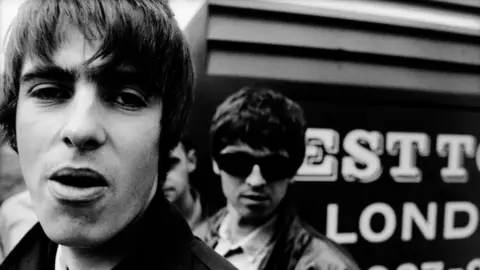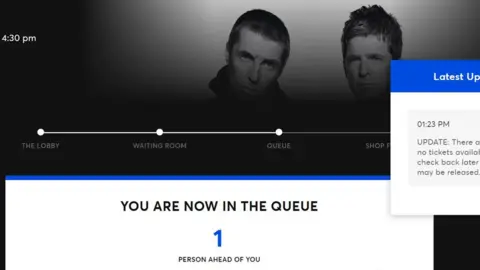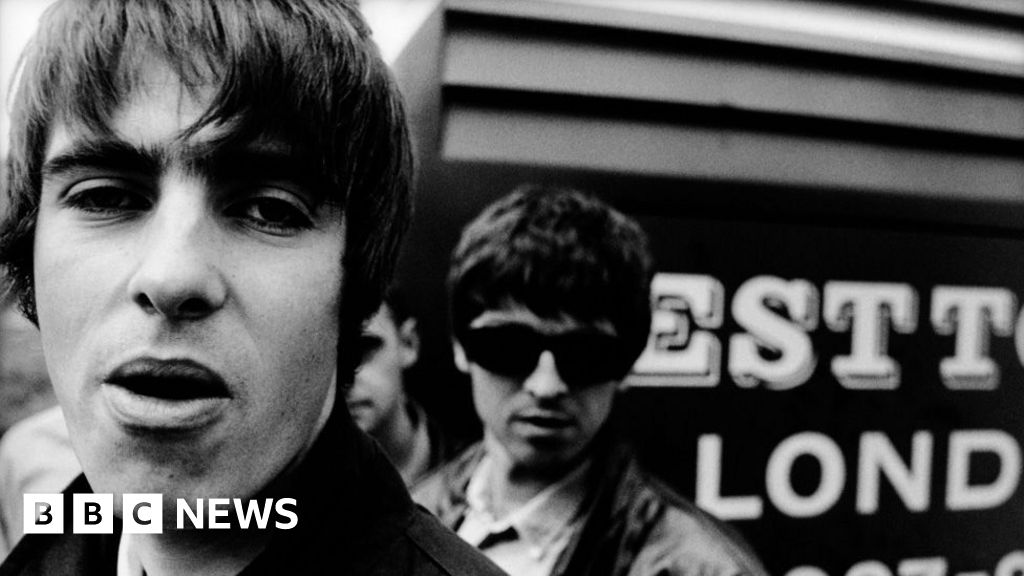 Getty Images
Getty ImagesThe excitement about the Oasis reunion turned sour for some fans when they were faced with prices that had more than doubled while they had spent hours in a virtual queue. Will the ensuing row over “dynamic pricing” have a lasting impact?
Oasis fan John and his family planned a major operation to buy Oasis tickets on Saturday – him on his phone and iPad while at work, in Burnley, his wife and son on their phones and laptop at home, in Cumbria, and his daughter on her phone, in Leeds.
“My wife and son were travelling across on the train over to Leeds, changing trains, and were on their phones constantly, in the queue,” he told BBC Radio 5 Live.
“My wife said she saw loads of other people in the same situation, all staring at their phones, trying to buy tickets.”
By mid-afternoon, after six hours in the online queue, John had given up, but his wife was eventually offered tickets – for £355 each.
“I find that just disgraceful,” he said.
Oasis have “built their career on the connection they’ve got with ordinary folk”, John said.
“But when you’ve queued all day and the price of the ticket has more than doubled, I just think they’ve broken their contract with the working class.
“They’re pretty dead to me now.”
‘It’s outrageous’
John and his family were among many stung by dynamic pricing for the Britpop band’s long-awaited reunion tour.
Some standard standing tickets advertised at £135 plus fees were relabelled “in demand” and changed on Ticketmaster to £355 plus fees.
“You can’t spend your whole day online trying to buy tickets expecting to pay one price, and you get to the front of the queue and it more than doubles,” John said.
“It’s outrageous.”
Another fan, Nicholas, from Macclesfield, in Cheshire, told BBC Radio 5 Live’s Nicky Campbell: “It’s greed, purely and simply.
“They will be looked at very differently.
“There should be difficult questions asked of the band.”
 Getty Images
Getty ImagesTicketmaster has said it does not set the prices, which are down to the “event organiser”, who “has priced these tickets according to their market value”.
Performers can opt in or out of the dynamic-pricing system but it is hard to know how much the Gallagher brothers themselves actually knew about the arrangement.
The “event organiser” ultimately means the promoters – SJM, Live Nation, which owns Ticketmaster, MCD and DF.
The tour deal would also have involved the band’s booking agents and managers, who would have discussed it with the two reuniting bandmates.
And opting in to dynamic pricing would mean a bigger payday.
But were those choices offered to the Gallaghers themselves?
‘Greedy scam’
In the past, some artists and their teams have decided against using dynamic pricing – Taylor Swift and Ed Sheeran are not thought to have used it for their latest UK tours.
And The Cure frontman Robert Smith has called it “a greedy scam”.
“All artists have the choice not to participate,” he wrote in 2023.
“If no artists participated, it would cease to exist.”
Other stars have said they had it applied without their direct knowledge.
In 2020, Crowded House said: “The band had no prior knowledge of these ‘In Demand’ tickets and did not approve this programme.”
So they told Live Nation to refund the difference between the original face value price and the higher “in demand” cost.
‘Money back’
Live Nation has tried to make dynamic pricing a common feature in recent years, especially in the US.
But there was a furore when it was used for Bruce Springsteen’s 2022 US tour, as top ticket prices briefly rose to $5,000 (£3,800), before dynamically dropping again.
The Boss later said most of his tickets were “totally affordable” but the money should go into the pocket of the artist and not a tout who would only resell the ticket for a similar or higher price.
“I’m going, ‘Hey, why shouldn’t that money go to the guys that are going to be up there sweating three hours a night for it?'” he told Rolling Stone.
“It [dynamic pricing] created an opportunity for that to occur.
“And so at that point, we went for it.
“I know it was unpopular with some fans.
“But if there’s any complaints on the way out, you can have your money back.”
‘Too much’
Live Nation’s boss has also said dynamic pricing reduces touting – and he wants to use it more widely in Europe as well as the US.
“Promoters are anxious for it,” chief executive Michael Rapino said in February.
“Artists are anxious for it because they see, when they sell an arena in Baltimore versus Milan right now, they look at the grosses and say, ‘Wow, we’re leaving too much on the table for the scalpers. Let’s price this better.'”
Better for whom, though?
‘Once-in-a-lifetime experience’
Ultimately, the Oasis shows did sell out by Saturday evening.
“It basically comes down to demand and supply,” Schellion Horn, competition economist at accounting firm Grant Thornton, told BBC Radio 5 Live.
“There are people out there for whom this is a once-in-a-lifetime experience and people are willing to pay that [much].”
But the real issue was a “lack of transparency”.
People expected prices to vary for other services such as flights and hotels – but “here, people had in their mind that they were going to get these lower ticket prices”.
“A lot of people finally got to the front of the queue, had invested four, five, six hours of their life [and] felt very invested, and suddenly had five minutes to decide whether to pay these higher prices,” Ms Horn said.
‘Huge price’
Music journalist John Robb, who recently interviewed Noel Gallagher for his site Louder Than War, told BBC Radio 4 the price fluctuations were “unfair”.
“The price should be the price,” he said.
“But maybe that’s an old-fashioned British way of looking at things.”
There should be legislation to regulate dynamic pricing, he added.
That is now a prospect, after the Oasis outcry led the government to add the issue to a review of ticket reselling it had already announced.
“There are a number of techniques going on here where people are buying a lot of tickets, reselling them at a huge price,” Prime Minister Keir Starmer told 5 Live on Monday.
“And that’s just not fair – it’s just pricing people out of the market.”
Will the controversy tarnish Oasis’ reputation?
Possibly, but the reunion shows are not for almost a year – by which time the fans who did buy tickets might just have paid off their overdrafts and credit-card bills, and be ready to forget the cost and revel in the music.


